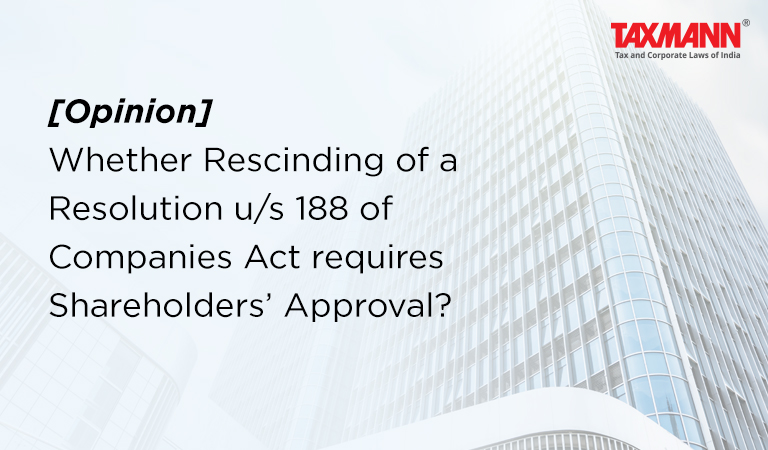[Opinion] Whether Rescinding of a Resolution u/s 188 of Companies Act requires Shareholders’ Approval?
- Blog|News|Company Law|
- 3 Min Read
- By Taxmann
- |
- Last Updated on 5 April, 2023

Dr K R Chandratre – [2023] 149 taxmann.com 37 (Article)
Statutory Framework
Section 188 empowers the Board of Directors of a company to enter into a related party transaction and requires, in the case of a company having a paid-up share capital of not less than such amount, or transactions not exceeding such sums, as may be prescribed, entered into except with the prior approval of the company by an ordinary resolution passed at a general meeting of the company.
According to the first Proviso to subsection (1), no contract or arrangement, in the case of a company having a paid-up share capital of not less than such amount, or transactions not exceeding such sums, as may be prescribed, shall be entered into except with the prior approval of the company by a resolution.
Section 188(1) expressly states that
“Except with the consent of the Board of Directors given by a resolution at a meeting of the Board and subject to such conditions as may be prescribed, no company shall enter into any contract or arrangement with a related party”,
thereby vesting the power of entering into related party transactions in the Board not in the members of the company; it is only in the case of a company having a paid-up share capital of not less than such amount, or transactions not exceeding such sums, as may be prescribed, that the approval of the members to the related party transaction entered into by the Board is necessary.
The words no company shall enter into also indicate that the section requires board’s approval for entering into by a company a contract or arrangement as specified in subsection (1) of section 188.
The section does not in terms provide for board’s approval for cancelling or rescinding a resolution which was passed for entering into a contract or arrangement; nor does the language used contemplate it.
The concept of passing a resolution for rescinding a resolution already passed is alien to the Companies Act, although there is no bar for such a resolution being passed voluntarily.
Related parties not to vote on resolution at general meeting
The second Proviso to subsection (1) of section 188 read as follows:
“Provided further that no member of the company shall vote on such resolution, to approve any contract or arrangement which may be entered into by the company, if such member is a related party.”
Thus, according to the first proviso, approval of the company is required for entering into a contract or arrangement. The words “no contract or arrangement, … shall be entered into except with the prior approval of the company by a resolution” are clear and unambiguous.
Requirement under LODR Regulations
Regulation 23(4) of the Securities and Exchange Board of India (Listing Obligations and Disclosure Requirements) Regulations, 2015 provides as follows:
“All material related party transactions and subsequent material modifications as defined by the audit committee under sub-regulation (2) shall require prior approval of the shareholders through resolution and no related party shall vote to approve such resolutions whether the entity is a related party to the particular transaction or not…”
It is obvious from the language of this provision, that shareholders’ approval by a resolution is required for a material related party transaction (meaning thereby approval for entering into a material related party transaction), and further that, all related parties shall not vote on such resolution. This provision too, kike section 188 of the Companies Act, does not contemplate approval of the shareholders for cancellation or rescission of the resolution by which a related party transaction was approved earlier.
Click Here To Read The Full Article
Disclaimer: The content/information published on the website is only for general information of the user and shall not be construed as legal advice. While the Taxmann has exercised reasonable efforts to ensure the veracity of information/content published, Taxmann shall be under no liability in any manner whatsoever for incorrect information, if any.

Taxmann Publications has a dedicated in-house Research & Editorial Team. This team consists of a team of Chartered Accountants, Company Secretaries, and Lawyers. This team works under the guidance and supervision of editor-in-chief Mr Rakesh Bhargava.
The Research and Editorial Team is responsible for developing reliable and accurate content for the readers. The team follows the six-sigma approach to achieve the benchmark of zero error in its publications and research platforms. The team ensures that the following publication guidelines are thoroughly followed while developing the content:
- The statutory material is obtained only from the authorized and reliable sources
- All the latest developments in the judicial and legislative fields are covered
- Prepare the analytical write-ups on current, controversial, and important issues to help the readers to understand the concept and its implications
- Every content published by Taxmann is complete, accurate and lucid
- All evidence-based statements are supported with proper reference to Section, Circular No., Notification No. or citations
- The golden rules of grammar, style and consistency are thoroughly followed
- Font and size that’s easy to read and remain consistent across all imprint and digital publications are applied



 CA | CS | CMA
CA | CS | CMA
